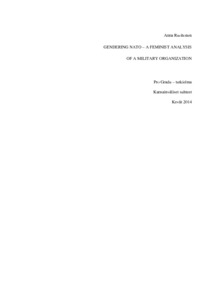Gendering NATO : a feminist analysis of a military organization
Ruohonen, Anna (2014)
Ruohonen, Anna
Lapin yliopisto
2014
openAccess
Julkaisun pysyvä osoite on
https://urn.fi/URN:NBN:fi:ula-201406241324
https://urn.fi/URN:NBN:fi:ula-201406241324
Tiivistelmä
The aim of this thesis is to explain how the benefits of gender are understood in NATO’s official gender policy agenda. During the past decade, gender issues have gained increasing attention with regards to conflict resolution and post-conflict reconstruction. The research material is gathered from NATO’s website, where the special section dedicated to gender policy has existed for some years. The empirical material consists of multiple kinds of documents, thus the analysis method is content analysis. By applying feminist international relations theory and Michel Foucault’s concepts of biopower and governmentality, it is shown that gender is perceived in NATO as a concept that is supposed to collaborate with organizational objectives. However, the accelerating “gender awareness” is not challenging the existing masculine power structures in NATO. At NATO, an inside enquiry has yielded the results that gender is not unequivocally defined. Regardless of the intricacy, gender is articulated to indicate the biolog cal female sex. Gender is also a biopolitical apparatus to govern the sexual difference between male and female.
This thesis concludes that NATO’s intentions of increasing female participation by mainstreaming gender perspectives is an attempt to react to the ongoing change in the security sector and to support peace and humanity, that by turn are the very concepts of modern era that should be re-evaluated. In Foucauldian sense, this is also a question of war and its definition. There is a relational force to the ways in which war intersects with power and life under modern conditions. It also has an individuating force.
The main dilemma of gender is twofold: female NATO-personnel are presented as empathic communicators, thus independent, whilst the women in targeted countries become presented as a homogenous group, which needs to be secured. All together the discussion about the role of women in the military, as the discussion of “women as victims” is a part of the process of globalization. The conclusions of this thesis are twofold. Firstly, we shall analyse the role of women working for the military, and the gender roles within the military. Secondly, when attention is given to the local women, we receive another concept of “womanhood”, which is created within Western feminist academic discourse by creating the “other” women. These “other” women are the ones to be secured. These two ways of perceiving womanhood does not lead to universal feminism, as it ends up promoting the division between the (developed) West and the (underdeveloped) rest. Another question is, if there should be a common feminist objective based on gender that is a very fluid concept even within feminist discourse.
This thesis concludes that NATO’s intentions of increasing female participation by mainstreaming gender perspectives is an attempt to react to the ongoing change in the security sector and to support peace and humanity, that by turn are the very concepts of modern era that should be re-evaluated. In Foucauldian sense, this is also a question of war and its definition. There is a relational force to the ways in which war intersects with power and life under modern conditions. It also has an individuating force.
The main dilemma of gender is twofold: female NATO-personnel are presented as empathic communicators, thus independent, whilst the women in targeted countries become presented as a homogenous group, which needs to be secured. All together the discussion about the role of women in the military, as the discussion of “women as victims” is a part of the process of globalization. The conclusions of this thesis are twofold. Firstly, we shall analyse the role of women working for the military, and the gender roles within the military. Secondly, when attention is given to the local women, we receive another concept of “womanhood”, which is created within Western feminist academic discourse by creating the “other” women. These “other” women are the ones to be secured. These two ways of perceiving womanhood does not lead to universal feminism, as it ends up promoting the division between the (developed) West and the (underdeveloped) rest. Another question is, if there should be a common feminist objective based on gender that is a very fluid concept even within feminist discourse.
Kokoelmat
- Pro gradu -tutkielmat [4965]
